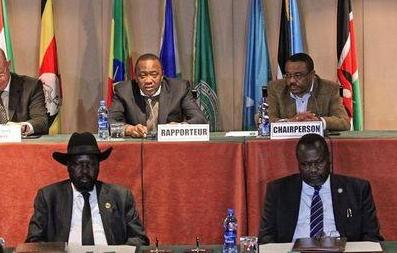IGAD told to “rethink” on South Sudan peace mediation
June 12, 2017 (JUBA) – Enough Project, an advocacy body on ending conflict, said regional leaders meeting in Addis Ababa, Ethiopia on the conflict in South Sudan should “embrace a radical rethink” to facilitate peace in the country.

In a statement issued ahead of the Intergovernmental Authority on Development (IGAD) summit of heads of states and governments on Monday, the Enough Project described it as an opportunity to end the devastating war.
“Because its war is spiraling, South Sudan needs a new, dynamic, and inclusive peace process. IGAD is currently charged with mediating but its approach is inadequate in the face of multiplying armed actors and a dying peace agreement from 2015,” said John Prendergast, Founding Director at the Enough Project.
He, however, warned against what he described as IGAD’s “unwilling to commit to revitalizing the peace process and make it more inclusive,” saying such failure will shift the responsibility to the African Union and the United Nations.
Brian Adeba, an Associate Director at Enough Project, said IGAD has no time to waste on South Sudan.
“The worsening humanitarian conditions in South Sudan and the escalating violence requires that international community leaders embrace a radical rethink of the stagnant peace process,” he said.
South Sudan’s peace agreement signed in Addis Ababa in August 2015 failed following resumption of conflict in the capital, Juba in July, 2016. The conflict has since spread to Equatoria and Bahr El Ghazal regions, which were initially considered peaceful during the earlier periods when violence broke out in mid-December, 2013.
“In order to push the warring parties toward a political solution, IGAD and other leaders should support international efforts, such as targeted financial pressures and an arms embargo. All concerned should also recognize how the conflict has evolved,” said Adeba.
He added, “It is no longer a binary duel, but involves many actors whose input is necessary to map a new path for peace.”
Jon Temin, Director of Policy and Research at the Enough Project, said the latest IGAD meeting provides an opportunity for the international community to revitalize its efforts at ending the devastating war in South Sudan.
“International efforts require much greater urgency and conviction. It is imperative that international actors come to a clear agreement concerning who is leading the mediation, and what role supporters can play. While IGAD has at times shown initiative, it has been lacking of late,” said Temin.
He added, “If IGAD is not prepared to lead and commit the necessary diplomatic resources and political will, that role should shift to the African Union or the United Nations, with strong support from the United States and other Troika members”.
President Salva Kiir, who was invited to attend the meeting, declined and sent First Vice President Taban Deng Gai to Addis Ababa for Monday’s meeting. The presidency, in a statement, said Kiir had other commitments.
(ST)
